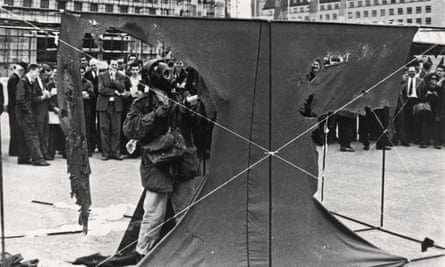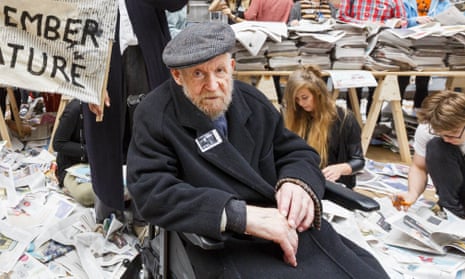Gustav Metzger, the inventor of auto-destructive art who spent a lifetime baffling, infuriating and thrilling audiences, as well as influencing generations of younger artists, has died aged 90.
A spokeswoman for the artist said he died at his home in London.
Metzger was born in Nuremberg to Polish-Jewish parents in 1926 and arrived with his brother in Britain on the Kindertransport in 1939. Much of his immediate family, including his parents, were murdered in the Holocaust.
He studied art in Cambridge, London, Antwerp and Oxford, and by the late 1950s was heavily involved in anti-capitalist and anti-consumerist movements, as well as the Campaign for Nuclear Disarmament.

This political activism was the motivation for his auto-destructive art manifesto of 1959 – which he described “as a desperate last-minute subversive political weapon ... an attack on the capitalist system ... an attack also on art dealers and collectors who manipulate modern art for profit”.
He produced art that was often not easy to understand. In 2004, when Tate Britain displayed Metzger’s Recreation of First Public Demonstration of Auto-Destructive Art, the installation included a rubbish bag.
A gallery cleaner threw the bag out. Metzger reportedly said the piece was ruined.
Metzger was a troublemaker in the best sense of the word, with a career full of fascinating asides. In 1969 he became the first editor of the London-based Computer Art Society’s journal, Page. In an interview with the Guardian in 2012 he recalled with pride: “I swung the journal around from technological messianism into recognising technology as a threat.”
His auto-destructive art message was followed by the Who’s Pete Townshend, a student of Metzger’s, who put it in to practice by trashing guitars.
It can all be traced back to Metzger’s childhood: “When I saw the Nazis march, I saw machine-like people and the power of the Nazi state. Auto-destructive art is to do with rejecting power.”
Metzger kept on working in to his old age and has been an inspiration to many younger artists. Liquid Crystal Environment, an immersive work, is currently on display at Tate Modern.
